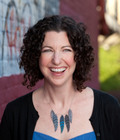Rachel Belle
Write an ethical will to pass on family values and traditions
 Seattle Rabbi Elana Zaiman travels the country conducting workshops about ethical wills.
Seattle Rabbi Elana Zaiman travels the country conducting workshops about ethical wills.
In the media, we hear a lot about the importance of writing a will, or at least a living will. But have you ever heard of an ethical will?
“It’s basically a letter that we write to the people we care about most, the people we love, to pass on our values, or wisdom and our love,” says Seattle rabbi Elana Zaiman.
Rabbi Zaiman leads workshops around the country on how to write an ethical will. She says the concept came about in medieval times, when the letters were usually written by fathers to their children.
“The Hebrew word for these documents is called tze-vah-oat, which means commandments, and that’s what they often felt like when they were being written in that period of time. But it was a sense of: here are the commandments that you should follow and this is what I want you to do. Sometimes, at the end of them, it said, ‘I want you to read this every year on such and such date.’ Sometimes we think that might be more of a sense of arrogance, but I think it’s kind of a sense of, this is important to me and I want you to be reminded.”
Today’s ethical wills can be as literal as a parent telling child, “I want you to go to church” to much broader themes, like, be kind, always ask questions and follow these family traditions.
“When you’re sitting down to write a document like this, you are thinking, ‘Wow, I might die.’ Right? I mean, that’s why this is so huge. If you have that in the back of your mind, it’s a very powerful activity. Because you’re thinking, what do you want to pass down to the people you love, what do you say? If this is the last thing they read, what do you tell them? So that if they are reading this, they then have a sense of who you are and what you’re passing on.”
The will can be presented after someone dies, but Zaiman thinks it is far more effective if given while the author is still living. Her father, also a rabbi, gave her his ethical will when she was 14 years old, and he’s still alive today.
“To my children,” Zaiman reads the start of the letter. “I expect you to take care of your mother, wherever she be, whatever she chooses to do. You honor me by honoring her. More important, you honor yourselves, for she gave you life. Respect one another, even if love is not possible. Take care of each other always. Your loyalty to each other was one of the chief joys of my life.”
Zaiman said she cried when she read it.
“What was powerful to me about receiving it was, here he was, this big congregational rabbi and I almost saw [him] as perfection. And in this letter he was real, he was admitting his own faults. To me that was so inspiring. Here’s my dad, he doesn’t think he’s perfect! The thing is, had he not written this, I would have known what he wanted. But I have it, I can pull it out and read it whenever I want. He’s on the opposite end of the country. When I miss him, I can just read it and I get a sense of who he is.”
Zaiman was teaching people about ethical wills for years before someone asked her why she hadn’t written her own, for her then 6-year-old son. So she did, sometimes using personal stories to instill values she wanted him to embrace.
“He was kind to this one woman in our community and at one point, after she lost her husband, he said to her, ‘Are you ever lonely?’ And she said, ‘Yeah, I get lonely sometimes.’ And he said to her, ‘Well, when you’re lonely, you should come sleep at our house.’ He wouldn’t remember this, but I did, so I put it in. Basically I used it as a way to talk about how he is compassionate and how compassion is a value of mine and I hope he continues with it.”
The document reminds us that we don’t have forever on this earth, and how important it is to say something before it’s too late.
“It’s hard to do and we tend, in this culture, to put aside those things that are hard to do and the time is always in the future and it’s never now. Think about it. What do you most want to say to the people you love? Your kids, your grandkids, your siblings, your nieces and nephews, what do you want to most say? Now is the time, you don’t have forever. Who are you? Who are they? What values do you want to impart?”
Rabbi Zaiman is working on a book on ethical wills. You can contact her about her ethical will workshops here.






































Comments